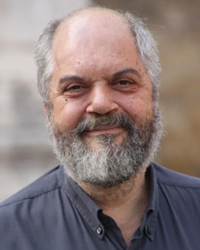ABCD 2025
The Biennial Congress of the Italian Association of
Cell Biology and Differentiation
Paestum, Italy • 24-26 September 2025

ABCD 2025
The Biennial Congress of the Italian Association of
Cell Biology and Differentiation
Paestum, Italy • 24-26 September 2025

ABCD 2025
The Biennial Congress of the
Italian Association of Cell Biology
and Differentiation
Paestum, Italy • 24-26 September 2025
The pre-congress meeting is reserved for post-docs and Ph.D. students, under 35 years old at the date of the congress, who will be presenting (oral or poster session) at the ABCD 2025 Congress.
The pre-congress meeting offers an invaluable opportunity for early-career scientists to engage in meaningful discussions about scientific challenges and advancements in a welcoming and interactive environment. This exclusive event provides the chance to connect with prominent scientists, fostering dialogue and collaboration.
Among the participants, twenty will be selected for oral presentations during the pre-congress meeting.
Highlights:
Simona
Paladino
Congress Chair
Naples, Italy
Pier Paolo
Di Fiore
Milan, Italy
Tom
Kirchhausen
Boston, MA, USA
Letizia
Lanzetti
Turin, Italy
Sara
Sigismund
Milan, Italy
 Letizia Lanzetti is Assistant Professor in Biochemistry at the University of Turin, Italy, and Group Leader of the Membrane Trafficking Laboratory at the Candiolo Cancer Institute. Her long-term research interest is the crosstalk between endocytosis and signaling in cancer cells. Her major contributions have been the identification of molecular mechanisms linking endocytosis and cell motility, and the role of endocytic molecules in mitosis.
Letizia Lanzetti is Assistant Professor in Biochemistry at the University of Turin, Italy, and Group Leader of the Membrane Trafficking Laboratory at the Candiolo Cancer Institute. Her long-term research interest is the crosstalk between endocytosis and signaling in cancer cells. Her major contributions have been the identification of molecular mechanisms linking endocytosis and cell motility, and the role of endocytic molecules in mitosis.
Her most recent work focuses on the impact of membrane trafficking, regulated by RAB proteins, on the metabolic plasticity of breast cancers. This is pursued using orthogonal approaches involving metabolic screenings, gene expression analyses, correlation with relevant clinical-pathological features in breast cancer patients, and high resolution studies to define the underlying molecular mechanisms.
 Letizia Lanzetti is Assistant Professor in Biochemistry at the University of Turin, Italy, and Group Leader of the Membrane Trafficking Laboratory at the Candiolo Cancer Institute. Her long-term research interest is the crosstalk between endocytosis and signaling in cancer cells. Her major contributions have been the identification of molecular mechanisms linking endocytosis and cell motility, and the role of endocytic molecules in mitosis.
Letizia Lanzetti is Assistant Professor in Biochemistry at the University of Turin, Italy, and Group Leader of the Membrane Trafficking Laboratory at the Candiolo Cancer Institute. Her long-term research interest is the crosstalk between endocytosis and signaling in cancer cells. Her major contributions have been the identification of molecular mechanisms linking endocytosis and cell motility, and the role of endocytic molecules in mitosis.
Her most recent work focuses on the impact of membrane trafficking, regulated by RAB proteins, on the metabolic plasticity of breast cancers. This is pursued using orthogonal approaches involving metabolic screenings, gene expression analyses, correlation with relevant clinical-pathological features in breast cancer patients, and high resolution studies to define the underlying molecular mechanisms.
 Seeing is believing; visual observations are a vital part of scientific studies. They are also key to the communication of science to the public and the participation of the public in the importance of scientific research and we use them to transmit knowledge and interpretation.
Seeing is believing; visual observations are a vital part of scientific studies. They are also key to the communication of science to the public and the participation of the public in the importance of scientific research and we use them to transmit knowledge and interpretation.
Direct observation of molecular events in vivo is a key goal of contemporary microscopy. Three recently developed forms of optical microscopy available in our laboratory -- Lattice Light Sheet Microscopy (LLSM), Lattice Light Sheet Microscopy optimized with Adaptive Optics (AO-LLSM) and focused ion beam scanning electron microscopy (FIB-SEM) -- are poised to bridge the gap between molecules and cells, either as independent entities in culture, as components of organoids, or as components of living tissues. The richness and magnitude of the data over periods ranging from seconds to hours, create new challenges for obtaining quantitative representations of the observed dynamics and for deriving accurate and comprehensive models for the underlying mechanisms needed to address problems in cell physiology and vertebrate development.
Our research program combines these frontier optical-imaging modalities with Artificial Intelligence Deep and Machine Learning methods to examine cellular membrane remodeling processes exemplified by cell size regulation and organization of the ER during cell division, post mitotic formation of nuclear pores complexes, organelle biogenesis, generation of intraluminal vesicles in endosomes, endosomal traffic and endosomal escape, immune responsiveness, lipid homeostasis, cell-cell recognition, and the interaction dynamics of SARS-CoV-2 or other viruses with host cells during early stages of infection.
 Seeing is believing; visual observations are a vital part of scientific studies. They are also key to the communication of science to the public and the participation of the public in the importance of scientific research and we use them to transmit knowledge and interpretation.
Seeing is believing; visual observations are a vital part of scientific studies. They are also key to the communication of science to the public and the participation of the public in the importance of scientific research and we use them to transmit knowledge and interpretation.
Direct observation of molecular events in vivo is a key goal of contemporary microscopy. Three recently developed forms of optical microscopy available in our laboratory -- Lattice Light Sheet Microscopy (LLSM), Lattice Light Sheet Microscopy optimized with Adaptive Optics (AO-LLSM) and focused ion beam scanning electron microscopy (FIB-SEM) -- are poised to bridge the gap between molecules and cells, either as independent entities in culture, as components of organoids, or as components of living tissues. The richness and magnitude of the data over periods ranging from seconds to hours, create new challenges for obtaining quantitative representations of the observed dynamics and for deriving accurate and comprehensive models for the underlying mechanisms needed to address problems in cell physiology and vertebrate development.
Our research program combines these frontier optical-imaging modalities with Artificial Intelligence Deep and Machine Learning methods to examine cellular membrane remodeling processes exemplified by cell size regulation and organization of the ER during cell division, post mitotic formation of nuclear pores complexes, organelle biogenesis, generation of intraluminal vesicles in endosomes, endosomal traffic and endosomal escape, immune responsiveness, lipid homeostasis, cell-cell recognition, and the interaction dynamics of SARS-CoV-2 or other viruses with host cells during early stages of infection.
 Pier Paolo Di Fiore is Full Professor of General Pathology at the University of Milan and Director of the Novel Diagnostics Program at the European Institute of Oncology (IEO) in Milan. He has dedicated his scientific career to deciphering the molecular mechanisms of oncogenic transformation, with particular emphasis on endocytosis and cancer stem cells, and to the application of ‘omics’ technologies to human cancers for the development of novel clinical tools for cancer management. Di Fiore’s work has helped redefine our understanding of endocytosis from being simply a mechanism for receptor attenuation to that of a master organizer of intracellular signaling, providing both spatial and temporal dimensions to signaling. He has also characterized molecular pathways critical to cancer stem cell biology and identified several diagnostic and prognostic signatures for breast and lung cancer.
Pier Paolo Di Fiore is Full Professor of General Pathology at the University of Milan and Director of the Novel Diagnostics Program at the European Institute of Oncology (IEO) in Milan. He has dedicated his scientific career to deciphering the molecular mechanisms of oncogenic transformation, with particular emphasis on endocytosis and cancer stem cells, and to the application of ‘omics’ technologies to human cancers for the development of novel clinical tools for cancer management. Di Fiore’s work has helped redefine our understanding of endocytosis from being simply a mechanism for receptor attenuation to that of a master organizer of intracellular signaling, providing both spatial and temporal dimensions to signaling. He has also characterized molecular pathways critical to cancer stem cell biology and identified several diagnostic and prognostic signatures for breast and lung cancer.
Di Fiore’s scientific accomplishments are widely recognized: he has published approximately 300 papers and book chapters, received numerous international awards, is an EMBO member, a member of the Accademia dei Lincei, and past president and member of the ABCD society.
 Pier Paolo Di Fiore is Full Professor of General Pathology at the University of Milan and Director of the Novel Diagnostics Program at the European Institute of Oncology (IEO) in Milan. He has dedicated his scientific career to deciphering the molecular mechanisms of oncogenic transformation, with particular emphasis on endocytosis and cancer stem cells, and to the application of ‘omics’ technologies to human cancers for the development of novel clinical tools for cancer management. Di Fiore’s work has helped redefine our understanding of endocytosis from being simply a mechanism for receptor attenuation to that of a master organizer of intracellular signaling, providing both spatial and temporal dimensions to signaling. He has also characterized molecular pathways critical to cancer stem cell biology and identified several diagnostic and prognostic signatures for breast and lung cancer.
Pier Paolo Di Fiore is Full Professor of General Pathology at the University of Milan and Director of the Novel Diagnostics Program at the European Institute of Oncology (IEO) in Milan. He has dedicated his scientific career to deciphering the molecular mechanisms of oncogenic transformation, with particular emphasis on endocytosis and cancer stem cells, and to the application of ‘omics’ technologies to human cancers for the development of novel clinical tools for cancer management. Di Fiore’s work has helped redefine our understanding of endocytosis from being simply a mechanism for receptor attenuation to that of a master organizer of intracellular signaling, providing both spatial and temporal dimensions to signaling. He has also characterized molecular pathways critical to cancer stem cell biology and identified several diagnostic and prognostic signatures for breast and lung cancer.
Di Fiore’s scientific accomplishments are widely recognized: he has published approximately 300 papers and book chapters, received numerous international awards, is an EMBO member, a member of the Accademia dei Lincei, and past president and member of the ABCD society.